Hillegersberg
Hillegersberg is a neighbourhood of Rotterdam, Netherlands. Primarily a green residential area with lakes, canals and parks, it was incorporated into the city of Rotterdam in 1941.
Hillegersberg | |
|---|---|
Neighbourhood in the City of Rotterdam | |
Bergse Dorpsstraat, Hillegersberg | |
 Flag  Coat of arms | |
Location of Hillegersberg in Rotterdam | |
| Coordinates: 51°57′05″N 4°29′20″E | |
| Country | Netherlands |
| Province | Zuid-Holland |
| Municipality | Rotterdam |
| Sub-Municipality | Hillegersberg-Schiebroek |
| Area | |
| • Total | 433 ha (1,070 acres) |
| Population | |
| • Total | 43,991 |
| Demonym(s) | Hillegersberger |
| Time zone | UTC+1 (CET) |
| • Summer (DST) | UTC+2 (CEST) |
| Postcode | 3045, 3051–3056 |
| Area code | 010 |
| Website | www |
History
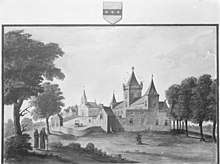
Hillegersberg was named after Hildegard van Vlaanderen, wife of Count Dirk II of Holland and West Friesland (920-988). The village was founded on a hill, form by a ridge of sand known locally as a donk or morre.[1][2] Local flint finds here indicate pre-historic occupation and later discoveries of Roman pottery, medals as well as a bust of Emperor Hadrian show subsequent early activity in the area.[3]
According to legend, this ridge was formed by sand dropped from the apron of the mythical giant Hillegonda. She was said to have built her house on this ridge and so Hillegersberg, then known as Hillegonda's mountain, was named. The image of the giant Hillegonda with her torn apron is shown on Hillegersberg's coat of arms.[4][5] A church and a castle, Huis ten Berghe, were subsequently built on the ridge.[6]
The castle was first mentioned in a certificate of November 2, 1269 documenting a loan from Vranke Stozep van Hildegardsberg.[7] Later in 1343, Heer Kerstant van den Berge owned the church and the castle.[8] However, in 1426, both church and castle were destroyed by the armies of Jacoba of Bavaria, during the Hoekse and Kabeljauwse quarrels. Remnants of the castle dungeon may still be found next to the Hillegondakerk in a corner of the cemetery, which dates from around 1500 in its present form.[9] The structure was designated a national monument in September 1973.[10]
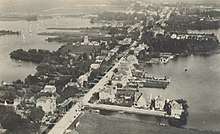
Hillegersberg's population grew from 2,000 inhabitants in 1885 to 7,000 in 1904. The border between Hillegersberg and Rotterdam has changed several times. In 1904 and 1920 parts of Hillegersberg were annexed by Rotterdam.[11] Despite this, Hillegersberg's population would increase to 5,000 in 1920.[12][13] In 1941, the area was absorbed completely in Rotterdam.[14] In 1979 the area became part of the sub-municipality of Hillegersberg-Schiebroek which then became a Gebied of the same name in 2014. A Gebied has an advisory commission which represents those living in the area. By January 2018, the sub-municipality of Hillegersberg-Schiebroek, of which Hillergersberg is a part, had a population of 43,991.[15][16]
Hillegersberg's growth has been explained partly due to its attractiveness for well-to-do residents because of its lakes such as the Bergse Plassen, attractions like the Plaswijckpark[17] and Lommerrijk, as well as its proximity to the centre of the city.[18][15] Hillegersberg is considered to be one of the most prosperous sub-municipalities of Rotterdam.[19] This is based on the number of expensive homes there, the quality of its amenities, and the luxury stores in its village centre.[20]
Character
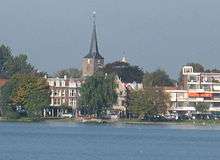
Hillegersberg has been described as a "leafy suburb (which) escaped wartime bombing, leaving its old village centre and elegant residential streets intact."[21][22] Plaswijk and other local recreation parks were first established here in the early 1920s.[17] Hillegersberg's amenities have increased over time, with the creation for example of the Lage Bergse Bos a recreational area of 216 hectare in 1970.[23][24] This wooded area, which lies to the North-east of Hillegersberg, is interspersed with open areas of water and grassland. A part of it is grazed by Scottish Highlander cattle.[23][25]
The village contains (with the addition of the Nieuwe Hillegersberg development) three shopping centres: the original village itself (around the old core - Bergse Dorpsstraat, Weissenbruchlaan), and the Kleiweg and its surrounding street and the shopping center at the Van Beethovensingel.[26]
A local resident organisation InHillegersberg was established in 2015 from the Bewonersorganisatie Molenlaankwartier along with residents of Oud-Hillegersberg (old Hillegersgerberg). Its aim is to improve communications to residents and to protect the neighbourhood from negative developments.[27]
Geography
_from_the_air.jpg)
Hillegersberg is located on the north side of the municipality of Rotterdam. It is located in an area of woods and lakes (the Bergse-Plassen), the site of two former peat excavations.[23] The Straatweg runs between these lakes, flanked by the large villas and apartment buildings. Eastern Hillegersberg is bordered by the river Rotte. However, water has presented serious problems to the residents. Many older houses suffer from foundation problems due to rotting wooden foundations, so-called ‘paalrot'[28] due to the lowering of the water table by the City authorities.[29][30][31]
The neighbourhood benefits from good communication links with Rotterdam International airport, four railways stations,[32] two tram lines (4 and 8), four bus lines (35, 174, B10 and B17) and the A20 Autoroute all lying in close proximity.[33]
The Sint Franciscus Gasthuis (hospital) is located on the south-western edge of Hillegersberg.[34]
Town Halls
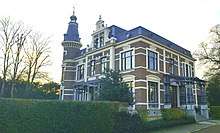
The last town hall of Hillegersberg, prior to its annexation by Rotterdam in 1941, was the Buitenlust villa on the C.N.A. Looslaan 1. This villa was built in 1884 in the style of the neo-Renaissance by architect J.J. van Waning (1830-1917) and was commissioned by the De Kat family.[35]
This building became the town hall of the independent municipality of Hillegersberg between 1921 and 1941. After the municipality's annexation by Rotterdam, it went on to hold the offices of the city's district of Hillegersberg-Schiebroek. This site is now the location for a nursery and kindergarten as well as a wedding hall.[36]
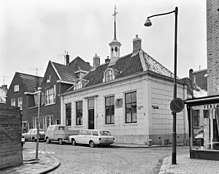
Hillegersberg's early town hall may be seen at 10 Kerkstraat in the area's old village centre. It was built in 1752 and is now serves as a location for a restaurant.[37][38]
Both buildings have been designated as national monuments.[35][37]
Education
Hillegersberg has twelve schools covering different ages and educational levels as specified and accredited by the Dutch education system.[39][25]
The American International School of Rotterdam (AISR) was established in the area in 1959.[40][41] In 2020, AISR became Nord Anglia International School Rotterdam.[42][43]
The Japanese School of Rotterdam, a Japanese international day school, was also set up here in 1996.[44][45] The Hague-Rotterdam Japanese Saturday School (ハーグ・ロッテルダム日本語補習授業校 Hāgu Rotterudamu Nihongo Hoshū Jugyō Kō), a Japanese Saturday school was also formed here in 1996 by the merger of existing Saturday schools in The Hague and Rotterdam,[46] holds its classes at the Rotterdam Japanese day school.[47][46]
Residents
- Janwillem van de Wetering spent his childhood in Hillegersberg
- Herman den Blijker celebrity chef
External links
- Ten Berghe Castle in Hillergersberg (Dutch)
- Hilligersberg-Schiebroek Guide
- History of the Jewish community in Hillegersberg (Dutch)
- Expat Guide to Hillegersberg-Schiebroek
- Rotterdam's history in a nutshell
- InHillegersberg residents association (Dutch)
Gallery
 farmland around the Hillegondakerk of Hillegersberg (1900s)
farmland around the Hillegondakerk of Hillegersberg (1900s) Lock bridge Boterdorpsebrug in Hillegersberg (2014)
Lock bridge Boterdorpsebrug in Hillegersberg (2014) Farm in the area surrounding Hillegersberg (undated)
Farm in the area surrounding Hillegersberg (undated) Castle ruin and church in Hillegersberg (2012)
Castle ruin and church in Hillegersberg (2012) Map of Hillegersberg village in 1611
Map of Hillegersberg village in 1611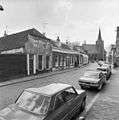 Hillegersberg old village centre (1978)
Hillegersberg old village centre (1978)_from_the_air.jpg) View of Hillegersberg with Rotterdam's centre lying behind (2017)
View of Hillegersberg with Rotterdam's centre lying behind (2017) Hillegersberg, as seen from the Bergsche Voorplas (undated)
Hillegersberg, as seen from the Bergsche Voorplas (undated) Hillegersberg's Prinsenmolen windmill
Hillegersberg's Prinsenmolen windmill Hillergersberg's Lage Bergse Bos (2018)
Hillergersberg's Lage Bergse Bos (2018)
References
| Wikimedia Commons has media related to Hillegersberg. |
- It is created from sprayed sand from dry riverbeds formed in the late ice age.
- A donk is a swamp, low-lying area of land that is saturated with water and unfit for agricultural purposes, marsh, bog
- rik (2013-12-16). "Excerpta Romana. De bronnen der Romeinsche Geschiedenis van Nederland". resources.huygens.knaw.nl (in Dutch). Retrieved 2018-06-16.
- "Het ontstaan van Hillegersberg - Stichting Histories Hillegersberg". www.stichtinghistorieshillegersberg.nl (in Dutch). Retrieved 2018-06-16.
- This event is depicted on the coat of arms of Hillegersberg
- "COLLECTIE ROTTERDAM - Laatmiddeleeuws kasteel Hillegersberg". www.rotterdaminkaart.nl. Retrieved 2018-06-16.
- Van Hildegardsbergin also appears in the lists of parishes where 1270 tithes were shown to have been levied to finance the crusades.
- According to various documents, Willem van Hildegaersberch was born here. W. van Hildegaersberch (c.1350 - c. 1408) is regarded as the first medieval 'fairy-tale speaker' of the Netherlands.
- "Het dorp Hillegersberg". De website van vriendenvandehillegondake! (in Dutch). Retrieved 2018-06-16.
- "32897 Bij Kerkstraat 43 3054 NB te Rotterdam". Rijksdienst voor het Cultureel Erfgoed (in Dutch). 2017-12-08. Retrieved 2018-06-16.
- The border between Rotterdam and Hillegersberg was originally at the end of the Bergweg; large parts of the current Oude Noorden in Rotterdam also originally belonged to Hillegersberg.
- Tweede Kamer, (1902-1903) Wijziging van de grens tusschen de gemeenten Rotterdam en Hillegersberg.
- "Bevolkingscijfers van Rotterdam vanaf 1868 | Stadsarchief Rotterdam". www.stadsarchief.rotterdam.nl (in Dutch). Retrieved 2018-06-16.
- The last mayor of Hillegersberg was Frederik Hendrik van Kempen (1879-1966). Just before the annexation by Rotterdam in 1941, a street in Hillegersberg was named after him. Just like Adrianus Johannes Breedveld (1873-1962), he had been a municipal councilor since 1918 and was alderman from 1919-1931, Maarten Dijkshoorn (1848-1930) who had been a councilor of Hillegersberg from 1887-1927 and was also alderman, and Johannes van Ballegooij (1889-1970), from 1925 until the end in 1941, municipal secretary of Hillegersberg.
- "Feitenkaart, Bevolkingsmonitor januari 2018 (Gemeente Rotterdam) | nvdemografie.nl". nvdemografie.nl (in Dutch). Retrieved 2018-06-16.
- In 2018 Hillergersberg residents statistics could be divided as follows: 20% between 0 and 14 years, 10% between 15 and 24 years, 25% between 25 and 44 years, 26% between 45 and 64 years, and 19% are 65 years or older. 34% of people are married and 52% are unmarried. The neighbourhood had a total of 20,100 households - which consisted of 42% single households, 24% double households and 35% households with one or more children. On average, a household consists of 2.2 people. (www.cbs.nl)
- "Over Plaswijckpark - Plaswijckpark". Plaswijckpark (in Dutch). Retrieved 2018-06-16.
- "Bergse Plassen | Stadsarchief Rotterdam". www.stadsarchief.rotterdam.nl (in Dutch). Retrieved 2018-06-16.
- Netherlands, Statistics. "Society". www.cbs.nl. Retrieved 2018-06-16.
- "Hillegersberg | Stadsarchief Rotterdam". stadsarchief.rotterdam.nl (in Dutch). Retrieved 2018-06-16.
- "Where to live in Rotterdam". www.expatica.com. 2016. Retrieved 2018-06-20.
- Information, Rotterdam Tourist. "Hilligersberg-Schiebroek | Rotterdam Tourist Information". Rotterdam Tourist Information. Retrieved 2018-06-20.
- Peat extraction here began in the 1500s. "Lage Bergse Bos | IVN". www.ivn.nl (in Dutch). Retrieved 2018-06-16.
- "Lage Bergse Bos | Stadsarchief Rotterdam". www.stadsarchief.rotterdam.nl (in Dutch). Retrieved 2018-06-16.
- Gazaleh-Weevers, Sheila; Agudo, Shirley; Moser, Connie (June 2007). Here's Holland. Eburon Uitgeverij B.V. ISBN 9789059721418.
- Carponen, Claire. "A Former Village, Rotterdam's Hillegersberg Neighborhood Offers Outdoor Pursuits". www.mansionglobal.com. Retrieved 2020-01-28.
- "InHillegersberg - Home". inhillegersberg.nl (in Dutch). Retrieved 2018-08-07.
- Hillegersberg-Schiebroek | Rotterdam.nl, Gemeente Rotterdam (2014). "OUD HILLEGERSBERG MAATREGELEN TEGEN PAALROT" (PDF). Gemeente Rotterdam (in Dutch). Retrieved 2018-06-24.
- "Problemen herkennen | paalrot.info". www.paalrot.info (in Dutch). Retrieved 2018-06-16.
- "InHillegersberg - Grondwater". inhillegersberg.nl (in Dutch). Retrieved 2018-06-17.
- "InHillegersberg - Historisch onderzoek naar de oorzaken van de grondwaterstandsdaling". inhillegersberg.nl (in Dutch). Retrieved 2018-08-07.
- Ansonika. "Train Service to Rotterdam". City Guide Rotterdam. Retrieved 2018-06-20.
- RET NV. "Discover greater Rotterdam with public transport". www.ret.nl. Retrieved 2018-06-18.
- "Franciscus Gasthuis&Vlietland, zorg van generaties - Franciscus Gasthuis & Vlietland". www.franciscus.nl (in Dutch). Retrieved 2018-06-18.
- "527203 C.N.A.Looslaan 1 3054 BN te Rotterdam". Rijksdienst voor het Cultureel Erfgoed (in Dutch). 2017-12-07. Retrieved 2018-06-22.
- "Nursery Straatweg | Hillegersberg | Child care | Crèche". www.kindergarden.nl. Retrieved 2018-09-01.
- "32901 Kerkstraat 10 3054 NC te Rotterdam". Rijksdienst voor het Cultureel Erfgoed (in Dutch). 2017-12-08. Retrieved 2018-06-22.
- "Restaurant 't Ambachthuys". Restaurant 't Ambachthuys Hillegersberg (in Dutch). Retrieved 2018-09-01.
- Google Maps. "Schools in Hillegersberg - Google Search". www.google.com. Retrieved 2018-06-18.
- "List of international schools in the Netherlands". Retrieved 2018-06-16.
- "American International School of Rotterdam - International School for Rotterdam and The Hague | The American International School of Rotterdam (AISR) - Early Learning (Kindergarten), Elementary, Middle and Secondary High School". www.aisr.nl. Retrieved 2018-06-16.
- "Nord Anglia - a new premium international school concept in Rotterdam". DutchNews.nl. Retrieved 2020-01-28.
- "Rotterdam | Schools Netherlands | Nord Anglia Education". www.nordangliaeducation.com. Retrieved 2020-01-28.
- "List of international schools in the Netherlands".
- "ロッテルダム日本人学校". www.jsrotte.nl (in Japanese). Retrieved 2018-06-16.
- "Introduction" (Archive). The Hague-Rotterdam Japanese Saturday School. Retrieved on April 5, 2015. Dutch version (Archive). Japanese version (Archive).
- "Home." The Hague-Rotterdam Japanese Saturday School. Retrieved on February 15, 2015. "Verhulstlaan 19 3055WJ Rotterdam The Netherlands"